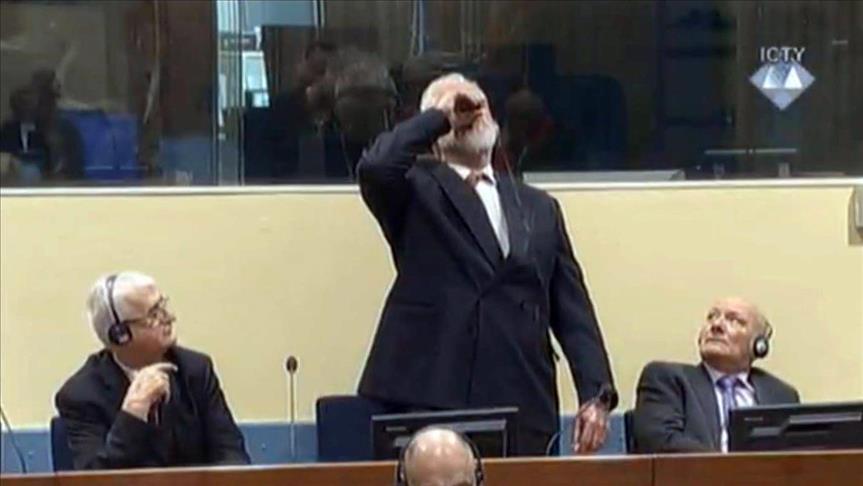UN court confirms death of Bosnian Croat war criminal


Slobodan Praljak died in a nearby hospital, says International Criminal Tribunal for the former Yugoslavia’s spokesman
A former Bosnian Croat general convicted of war crimes died in hospital after drinking poison in a UN court on Wednesday, a UN court has confirmed.
The case at the International Criminal Tribunal for the former Yugoslavia (ICTY) in The Hague came to an abrupt halt when Slobodan Praljak stood up, rejected the verdict, and drank what he said was poison from a small bottle.
“Slobodan Praljak is not a war criminal. I reject this verdict with contempt,” he shouted. His lawyer also said Praljak had taken a substance, and the presiding judge ended the proceedings.
Croatia’s official news agency HINA announced, based on information gathered from close relatives, that Praljak died in the hospital.
The breaking news was also published on many other local Croatian and Bosnian news outlets.
Later, the official information about Praljak’s death was confirmed by Nenad Golcevski, a spokesman for the Hague Tribunal.
“Praljak was transported to a nearby hospital in order to receive further medical assistance and died there. According to standard procedures, the Dutch authorities launched an independent investigation,” said Golcevski.
Praljak was one of six former Bosnian Croat political and military leaders of the self-proclaimed Croatian Republic of Herzeg-Bosnia which existed during the 1992-1995 Bosnian War.
Victims and criminals
The group was appealing a string of war crimes verdicts.
Praljak, 72, had launched an appeal over a 2013 verdict against wartime Croatian figures sentenced to a total of 111 years in prison for crimes committed in the Bosnian conflict.
Bakir Izetbegovic, a Bosniak member of the Bosnia’s tripartite presidency, said that the verdicts should be accepted.
“We will never forget the victims and criminals. We will always remember evil and criminals but we want cooperation with the bright side of Croatian politics,” saidIzetbegovic.
He recalled that Croatia carried out an aggression against Bosnia and Herzegovina.
“This is the past. However, we are ready to strengthen this light side of these relations and to try to make relations on the mutual benefit of Bosnia and Croatia,” said Izetbegovic.
Meanwhile, Croatian Prime Minister Andrej Plenkovic expressed his sympathies for Praljak’s family in a news conference in Croatia’s capital Zagreb.
“On behalf of the Government of the Republic of Croatia, and I personally want to express the deepest condolence of the family of the genre, Slobodan Praljak, his act, which unfortunately we all witnessed today, speaks most of the deep moral injustice against six Croats from Bosnia and Herzegovina and the Croatian people. We also express dissatisfaction and regret over the confirmed verdicts for the six,” said Plenkovic.
Verdict read out
Later Wednesday, the judges continued reading out the final verdict.
They group of six were convicted of crimes against humanity and violations of the laws and customs of war during the war in Bosnia and Herzegovina during the 1990s.
There was no change in the sentences given to the Croat military and political leaders from 2013. The six prosecuted Croats were found guilty of crimes against humanity committed in the 1990s Bosnian war and violations of the laws of war and the Geneva convention.
The group in 2013 was convicted of demolishing of the Old Bridge in Mostar, but in Wednesday’s ruling they were not held responsible.
The Appeals Council ruled that the Mostar Bridge was a “military target” and its demolition was not a crime, but also did not reduce their overall sentences.
The Appeal Council also once again confirmed that then-Croatian President Franjo Tudjman joined forces with the Croatian forces in the country during the Bosnian war in a “joint criminal enterprise”.
In his first ruling in 2013, Prlic was sentenced to 25 years in prison, Stojic, Praljak and Petkovic to 20 years, Coric to 16 years, and Pusic to 10 years.
The first indictment of Prlic and others was drafted in 2004, and was last amended in 2008. The six Croats, on their own accord, surrendered to The Hague tribunal in 2004.
Source:
